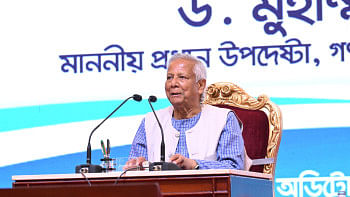Progress made, but concern remains
The UN Committee on Economic, Social and Cultural Rights has expressed concern about repeated reports of shrinking space for human rights defenders, including journalists, trade union activists, civil society activists, and for dissenting voices in general.
It voiced concern about overbroad restrictions on the activities of rights defenders imposed by certain provisions in legislation or proposed legislation of Bangladesh, including the draft Digital Security Act 2018.
The Geneva-based committee recommended ensuring a safe and favourable environment for rights defenders, reviewing the legislation, particularly Section 57 of the ICT Act and similar provisions in the draft Act and repealing the Special Powers Act, 1974.
It, however, lauded Bangladesh for achieving progress in poverty reduction, gender equality as well as attaining qualification for graduation from LDC to a developing country.
The committee yesterday published its findings on the civil and political rights records of Mexico, Niger, Bangladesh, Central African Republic, Spain and New Zealand.
The UN body expressed worries about the pervasiveness of corruption and its devastating impact on the enjoyment of economic, social and cultural rights, particularly by disadvantaged and marginalised individuals and groups.
It also recommended improving public governance and ensuring transparency in the conduct of public affairs by making sure that anti-corruption legislation is strictly enforced and that all those involved in corruption, particularly high-level officials and politicians, are prosecuted without exception and also by enhancing independence and efficacy of the Anti-Corruption Commission.
The committee said it was concerned about the absence of explicit constitutional and legislative recognition of the rights of “tribes”, “minor races”, “ethnic sects and communities”.
Repeated reports of expropriation of ancestral land of indigenous people without meeting the requirements of free, prior and informed consent were also a matter of concern, said the UN body.
It said there was lack of appropriate mechanisms for affected indigenous people and communities to take part in the decision-making processes.
The committee suggested that the government should expedite the enactment of a law recognising and protecting the rights of indigenous people in full compliance with relevant international human rights standards; set up appropriate mechanisms to ensure the representation and participation of indigenous people -- both in the hill tracts and plains -- in all decision-making processes.
The authorities should ensure that the requirements of free, prior and informed consent are met in all cases of expropriation of land of indigenous people. They should provide effective mechanisms through which indigenous people can seek remedies for the deprivation of ancestral land and also should ratify the International Labour Organization Indigenous and Tribal Peoples Convention, 1989, said the UN body.
About the Chittagong Hill Tracts accord, the committee said it was concerned at the insufficient level of implementation of the deal, particularly relating to land dispute resolution. It regretted the lack of information on the status of decisions made on the land dispute applications brought to the CHT Land Dispute Resolution Commission.

 For all latest news, follow The Daily Star's Google News channel.
For all latest news, follow The Daily Star's Google News channel. 



Comments